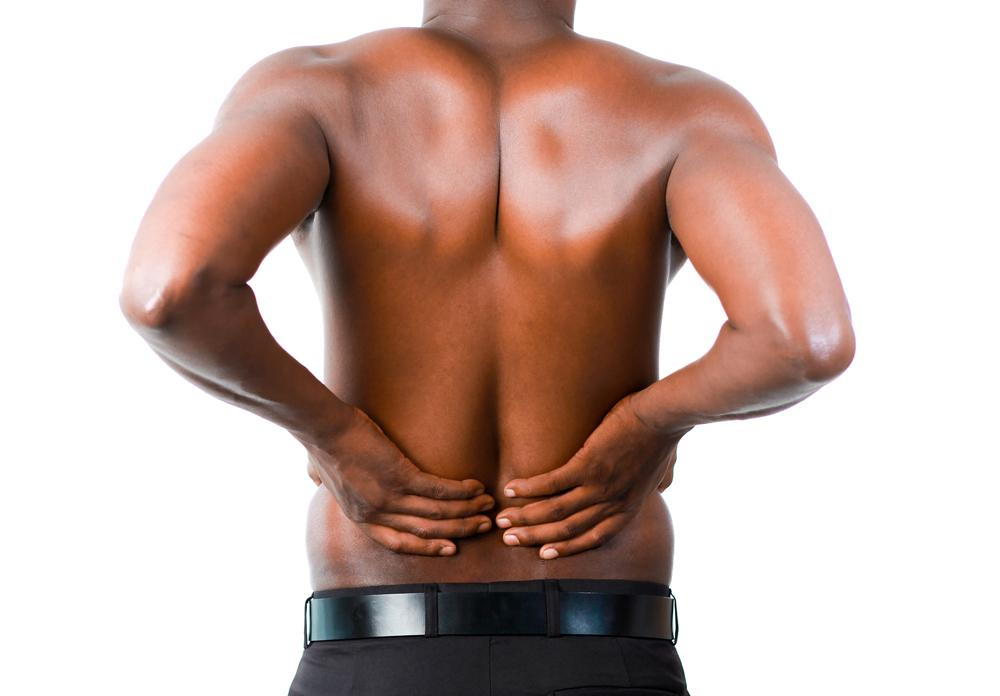Degenerative Disc Disease

- posted: Jan. 27, 2020
Do you experience pain in your lower back, buttocks, and
thighs? Does this pain range from dull to severe and occasionally
debilitating? Do you ever experience numbness or tingling in your arms and
legs? If so, you may be suffering from degenerative disc disease.
Regardless of the name, this is not actually a disease. Rather,
this is a condition caused by different forces over time. When your back
and spine are healthy, you should be able to stand at your full height,
bend, flex, and twist. The discs within your spine allow this. They are
also shock absorbers, there to ensure that your bones do not take the full
force of any pressure applied to your back.
No matter who you are, everyone will eventually begin to
experience wear on their discs, thanks to the aging process. Vertebral
discs are rubbery and will begin to shrink and lose their natural
structure. Most people older than 60 show some form of disc degeneration. What
causes this degeneration in the first place?
Well, there are a few factors that can cause disc degeneration
and subsequent pain. As stated above, most people older than 60 show some
form of disc degeneration. This is because as we age, our discs begin to dry
out and the ability of the disc to absorb shock is diminished. Disc
degeneration can, however, be advanced and worsened by repetitive motions in
daily activities and sports, as well as injuries such as auto accidents
that cause soreness and swelling. There is very little blood flow to the
discs as opposed to other areas of the body, so a disc does not have the
ability to heal as fast once they are injured.
A few symptoms of degenerative disc diseases were mentioned
above, but unfortunately, they do not stop there. There is dull to severe
pain in the lower back, buttocks, and thighs as well as numbness or
tingling in the extremities, as mentioned above. Other symptoms include
neck pain that extends to the arms and hands, pain that worsens when
sitting, bending, lifting and twisting, pain that lessens when moving or
lying down, and periods of severe pain that last anywhere from days to
months.
The best way to prevent this condition is to get a proper
amount of exercise to build up the muscles that support your back. However,
if these symptoms are experienced, a diagnosis may occur through use of
medical history examination, description of symptoms, X-rays, and MRI
scans. Many doctors may recommend viable options for treatment such as
Chiropractic, Physical therapy, medications, and heat and cold therapy.
Some may also recommend surgery, though there are options in your best
interest to allow you to avoid this option, like spinal decompression
therapy.
Spinal decompression is a chiropractic low risk, non-invasive,
and non-surgical treatment that utilizes a table controlled by computers to
provide traction and relaxation of the spinal discs. Decompression therapy
helps pull your disc material back to its normal position and allows
nutrients to flow into the discs.

- posted: Jan. 27, 2020
Do you experience pain in your lower back, buttocks, and
thighs? Does this pain range from dull to severe and occasionally
debilitating? Do you ever experience numbness or tingling in your arms and
legs? If so, you may be suffering from degenerative disc disease.
Regardless of the name, this is not actually a disease. Rather,
this is a condition caused by different forces over time. When your back
and spine are healthy, you should be able to stand at your full height,
bend, flex, and twist. The discs within your spine allow this. They are
also shock absorbers, there to ensure that your bones do not take the full
force of any pressure applied to your back.
No matter who you are, everyone will eventually begin to
experience wear on their discs, thanks to the aging process. Vertebral
discs are rubbery and will begin to shrink and lose their natural
structure. Most people older than 60 show some form of disc degeneration. What
causes this degeneration in the first place?
Well, there are a few factors that can cause disc degeneration
and subsequent pain. As stated above, most people older than 60 show some
form of disc degeneration. This is because as we age, our discs begin to dry
out and the ability of the disc to absorb shock is diminished. Disc
degeneration can, however, be advanced and worsened by repetitive motions in
daily activities and sports, as well as injuries such as auto accidents
that cause soreness and swelling. There is very little blood flow to the
discs as opposed to other areas of the body, so a disc does not have the
ability to heal as fast once they are injured.
A few symptoms of degenerative disc diseases were mentioned
above, but unfortunately, they do not stop there. There is dull to severe
pain in the lower back, buttocks, and thighs as well as numbness or
tingling in the extremities, as mentioned above. Other symptoms include
neck pain that extends to the arms and hands, pain that worsens when
sitting, bending, lifting and twisting, pain that lessens when moving or
lying down, and periods of severe pain that last anywhere from days to
months.
The best way to prevent this condition is to get a proper
amount of exercise to build up the muscles that support your back. However,
if these symptoms are experienced, a diagnosis may occur through use of
medical history examination, description of symptoms, X-rays, and MRI
scans. Many doctors may recommend viable options for treatment such as
Chiropractic, Physical therapy, medications, and heat and cold therapy.
Some may also recommend surgery, though there are options in your best
interest to allow you to avoid this option, like spinal decompression
therapy.
Spinal decompression is a chiropractic low risk, non-invasive,
and non-surgical treatment that utilizes a table controlled by computers to
provide traction and relaxation of the spinal discs. Decompression therapy
helps pull your disc material back to its normal position and allows
nutrients to flow into the discs.
Our Regular Schedule
Office Hours
Monday
7:00 am - 6:00 pm
Tuesday
7:00 am - 6:00 pm
Wednesday
7:00 am - 6:00 pm
Thursday
7:00 am - 6:00 pm
Friday
7:00 am - 5:00 pm
Saturday
Closed
Sunday
Closed
Adjustment Hours
Monday
7:00 am - 10:30 am
2:30 pm - 6:00 pm
Tuesday
By Appointment
Wednesday
7:00 am - 10:30 am
2:30 pm - 6:00 pm
Thursday
By Appointment
2:30 pm - 6:00 pm
Friday
7:00 am - 10:30 am
By Appointment
Saturday
Closed
Closed
Sunday
Closed
Closed
Our Convenient Location
Find us on the map
Synergy Oviedo Chiropractic
1791 East Broadway St
Oviedo, FL 32765, US


